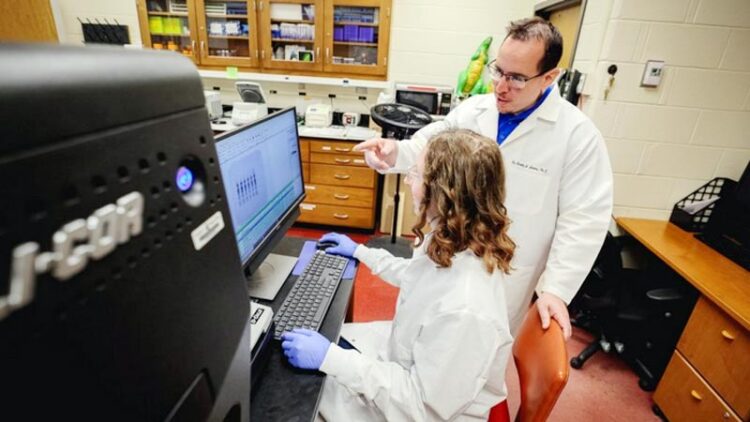New research finds mechanism that regulates PTSD in the female brain

Kayla Farrell, Ph.D candidate in the School of Animal Sciences, works in Tim Jarome's lab. Photo by Luke Hayes for Virginia Tech
“For it to be doing this function in the context of PTSD in females is very surprising” said Tim Jarome, an associate professor in the College of Agriculture and Life Sciences’ School of Animal Sciences.
From humans to plants to single-cell organisms, there’s a protein that rules them all.
This protein does general housekeeping of the cells, regulating them through normal daily functions.
Virginia Tech researchers found that one specific form of this ubiquitous protein has a different function in the female brains – it helps regulate events in the memory that cause post-traumatic stress disorder (PTSD).
Watch video: https://video.vt.edu/media/1_lnhr71n4
“The protein is primarily thought of as a protein that marks other proteins to be destroyed,” said Tim Jarome, an associate professor in the College of Agriculture and Life Sciences’ School of Animal Sciences. “For it to be doing this function in the context of PTSD in females is very surprising.”
This protein, ubiquitin, even has its name originating from ubiquitous because of its presence across all walks of life. The form of this protein that the researchers could manipulate, called K-63, was selective in forming fear memories in the female brain.
“Oftentimes, molecules are found in the brain that are involved in forming these fear-based memories in both sexes, and this is the first time that we found one that’s selectively involved in one sex,” Jarome said. “In particular, this was found in the sex that seems to be more likely to have PTSD. It’s rare to find these mechanisms that are specific to one sex in terms of regulating the underlying factors that cause PTSD.”
The discovery could lead to the development of better therapeutic treatments. Kayla Farrell, a Ph.D. candidate in the School of Animal Sciences, was the project lead.
The research was published recently in Molecular Psychiatry in the Nature Portfolio of Journals. The research was supported by a grant from the National Institute of Mental Health.
PTSD is a complex disorder with a variety of therapeutic treatment options that include pharmacological approaches. By having a specific molecule to target, pharmacological approaches could be considered.
“Right now, treatment options are not very effective and the success rate isn’t very good,” Jarome said. “PTSD is not created equal among patients, and we know females are more likely to have it. The therapeutic approaches that we take to treat it might have to differ between males and females. This may be a mechanism in which we could specifically target treatment in females as a way to treat PTSD.”
Journal: Molecular Psychiatry
Media Contacts
Max Esterhuizen
Virginia Tech
max.esterhuizen@vt.edu
Office: 540-231-6630
Margaret Ashburn
Virginia Tech
mkashburn@vt.edu
Office: 540-529-0814
All latest news from the category: Life Sciences and Chemistry
Articles and reports from the Life Sciences and chemistry area deal with applied and basic research into modern biology, chemistry and human medicine.
Valuable information can be found on a range of life sciences fields including bacteriology, biochemistry, bionics, bioinformatics, biophysics, biotechnology, genetics, geobotany, human biology, marine biology, microbiology, molecular biology, cellular biology, zoology, bioinorganic chemistry, microchemistry and environmental chemistry.
Newest articles

Innovative 3D printed scaffolds offer new hope for bone healing
Researchers at the Institute for Bioengineering of Catalonia have developed novel 3D printed PLA-CaP scaffolds that promote blood vessel formation, ensuring better healing and regeneration of bone tissue. Bone is…

The surprising role of gut infection in Alzheimer’s disease
ASU- and Banner Alzheimer’s Institute-led study implicates link between a common virus and the disease, which travels from the gut to the brain and may be a target for antiviral…

Molecular gardening: New enzymes discovered for protein modification pruning
How deubiquitinases USP53 and USP54 cleave long polyubiquitin chains and how the former is linked to liver disease in children. Deubiquitinases (DUBs) are enzymes used by cells to trim protein…



